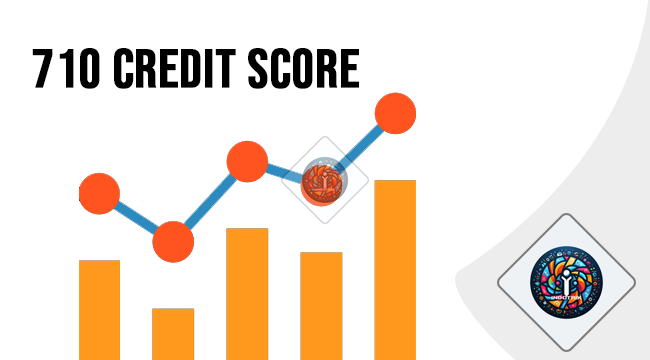
When I first saw my credit score hit 710, I felt a mix of relief and curiosity. Was it good? Could it be better? And most importantly, what could I do with it? If you’re in the same boat, you’re not alone. A 710 credit score is often considered a solid standing, but understanding its full potential can open doors you didn’t even know existed.
Let’s dive into the nitty-gritty of a 710 credit score, from what it really means to how it can influence your financial future. And yes, we’ll keep it fun, relatable, and packed with insights you can actually use.
What Is a 710 Credit Score?
A 710 credit score lands you in the “Good” range on most scoring models, such as FICO and VantageScore. Credit scores generally fall into these categories:
- Poor: 300-579
- Fair: 580-669
- Good: 670-739
- Very Good: 740-799
- Excellent: 800-850
Sitting at 710 means you’re already in a favorable spot, but there’s always room to level up. It’s like being on the varsity team in high school—great, but you could still aim for the MVP title.
Why Does a 710 Credit Score Matter?
1. Better Loan Approvals
With a 710 score, you’re more likely to be approved for loans and credit cards. While you might not snag the absolute lowest interest rates, you’re close enough to enjoy competitive offers.
2. Lower Interest Rates
A higher score usually means lenders see you as a lower risk. This translates to better interest rates on mortgages, auto loans, and even personal loans, saving you money in the long run.
3. Increased Credit Card Perks
Credit card issuers love customers with good scores. With a 710, you can qualify for cards offering cashback, travel rewards, or 0% APR introductory offers.
4. Leverage in Negotiations
Your credit score isn’t just a number—it’s a bargaining chip. Use it to negotiate better terms on loans or even utility deposits.
What Can You Do With a 710 Credit Score?
1. Apply for a Mortgage
A 710 score makes you a strong candidate for home loans. Lenders typically prefer scores above 700, so you’re in a great position to start your homeownership journey.
2. Upgrade Your Credit Card
This is the perfect time to explore premium credit cards. Whether you’re eyeing travel perks or hefty cashback, your score can help you qualify for top-tier options.
3. Refinance Loans
Already have a loan? Consider refinancing to take advantage of better rates that your good score now makes possible.
4. Start a Side Hustle
Thinking of launching a small business? Your credit score can help you secure a business loan or credit line to fund your entrepreneurial dreams.
How to Improve a 710 Credit Score
While 710 is good, there’s no harm in aiming higher. Here are some actionable tips to boost your score:
1. Pay Bills on Time
Payment history is the most significant factor in your score. Automate payments or set reminders to avoid missing due dates.
2. Keep Credit Utilization Low
Aim to use less than 30% of your credit limit. For example, if your credit card limit is $10,000, try to keep your balance below $3,000.
3. Diversify Your Credit Types
Having a mix of credit types—like a credit card, auto loan, and mortgage—can improve your score. It shows lenders you can handle different forms of credit responsibly.
4. Avoid Too Many Hard Inquiries
Applying for multiple credit accounts in a short period can lower your score. Be strategic about when and why you apply for new credit.
5. Monitor Your Credit Report
Mistakes on your credit report can drag down your score. Review your report annually and dispute errors promptly.
The Emotional Side of Credit Scores
Here’s the thing: a credit score is just a number, but it often feels like so much more. When I hit 710, I didn’t just see a good score—I saw years of hard work paying off. The late nights stressing over student loans, the discipline to avoid maxing out my cards, and the determination to rebuild after financial missteps all came together in that number.
But don’t let your score define you. It’s a tool, not a measure of your worth. Use it to achieve your goals, whether that’s buying a home, traveling the world, or simply having peace of mind about your finances.
Common Myths About a 710 Credit Score
Let’s bust some myths that might be holding you back:
1. “Good Scores Guarantee Loan Approvals”
While a 710 score improves your chances, lenders also consider income, debt-to-income ratio, and other factors.
2. “Checking Your Score Hurts It”
Soft inquiries, like checking your own score, don’t impact your credit. It’s the hard inquiries, like applying for a loan, that matter.
3. “Closing Old Accounts Will Boost Your Score”
Closing old accounts can actually hurt your score by reducing your credit history length and available credit.
Real-Life Applications of a 710 Credit Score
A friend of mine, Sarah, recently secured a car loan with a 710 score. While she didn’t qualify for the rock-bottom rates, she still got a deal that saved her thousands compared to her old loan. Another friend used their 710 score to get a credit card with travel perks, racking up points for a dream vacation.
The takeaway? A 710 score is a springboard. Whether you’re aiming for financial freedom, big purchases, or just some breathing room, it’s a solid foundation to build on.
Closing: Make Your 710 Work for You
So, what does a 710 credit score mean? It means opportunity. It’s a sign that you’re on the right track, but it also holds the promise of even greater possibilities.
Don’t stop here. Use your score to negotiate, explore, and achieve. And remember, while it’s important to manage your credit wisely, life is about more than numbers. Celebrate your progress, learn from your mistakes, and keep moving forward.
Your 710 score is just the beginning—what’s next is entirely up to you.





